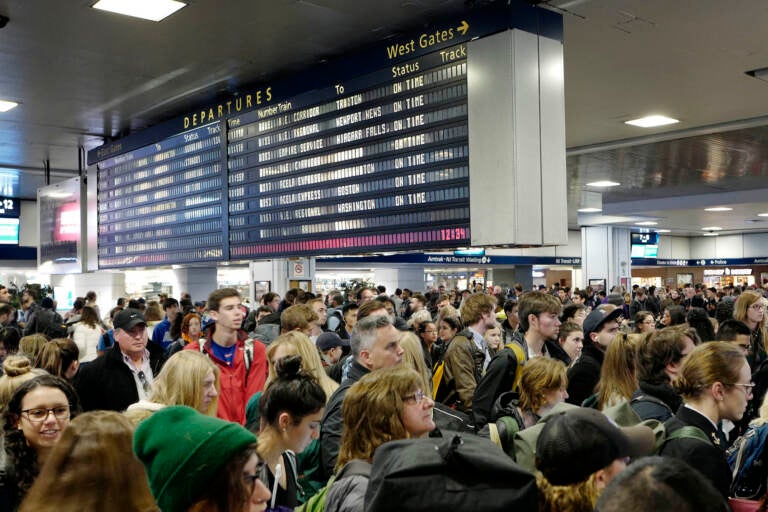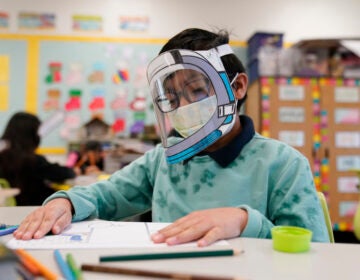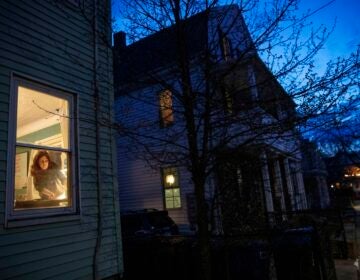What COVID-19 precautions should I take over the holidays?
Thursday will be our second pandemic Thanksgiving. The vaccines have helped, but there are still steps we can take to keep everyone safe.
Listen 4:17
Passengers stand beneath an electronic signboard in New York's Penn Station as they wait to board a train, Sunday, Nov. 27, 2016. Millions of Americans are returning home Sundy after the long Thanksgiving weekend. (AP Photo/Mark Lennihan)
This is one of a series of articles in which reporters from WHYY’s Health Desk Help Desk answer questions about vaccines and COVID-19 submitted by you, our audience.
Thursday will be our second pandemic Thanksgiving. We’ve learned many lessons about COVID-19, and the vaccines have helped with our comfort level about getting together. But that doesn’t mean there aren’t still precautions that can be taken as we gather for this holiday, through the start of Hanukkah at sundown on Nov. 28, and on until New Year’s.
“I think everybody was hoping this time last year that today, a year from that point, we’d be able to say, ‘There’s very little worry, very little concern.’ But that is not the case,” said Dr. Richard Wender, professor and chair of the Department of Family and Community Medicine at the Perelman School of Medicine at the University of Pennsylvania.
“I always tell people, ‘Listen, when you’re dealing with something like a global pandemic, you just gotta take life day-by-day and not act as if the ending has already arrived, because it hasn’t, and in many parts of the country, COVID rates are quite high right now.”
WHYY’s Health Desk Help Desk reached out to local physicians for some holiday advice. Here are some safety measures you can consider when planning your gathering.
What tools do we have now we didn’t have last year?
Vaccines, of course, and there’s also greater access to different types of coronavirus testing, including rapid home tests.
“The complicating news is that having more tools sometimes makes your decision-making a little more difficult. And then I think the third factor, which can make it a little bit more difficult, is that not everybody is vaccinated, not everybody has the same worry about COVID. Some people are very worried and very cautious, and others are not worried at all. And sometimes those different ends of the spectrum exist in the same family or in the same social circles. So that can be complicated,” Wender said.
“We shouldn’t lose sight of the fact, though, that we have a lot more tools to have a safe gathering now than we did last year, and everyone should try to take advantage of that,” he added. “The most important protection unquestionably is vaccination, and the evidence is incontrovertible. Not only is there a lower risk of serious COVID and death from COVID, there is a dramatically lower chance of even being infected with COVID in the first place.”
Dr. Lori Handy, medical director of infection prevention and control and attending physician in the division of infectious diseases at Children’s Hospital of Philadelphia, said she’s very hopeful this year will be much more joyful because of vaccines.
She said getting vaccinated is the best tool for protection over the holidays, emphasizing that they are most effective two weeks after your second mRNA dose (or after the single-dose Johnson & Johnson).
“Those who are fully vaccinated can spend time with their families and really feel very well-protected,” Handy said. “We also have great masks available for everybody. So if you’re going to a crowded public space, even vaccinated people should keep masks on if you’re in a community with substantial to high transmission. And I think between vaccines, mask use, and excellent hand hygiene, people can spend a lot more time with other folks than they did last year.”
What should I do in the weeks before a holiday gathering?
If you want to get either of the mRNA vaccines, Moderna or Pfizer, you need to get your first dose right away. It’s already too late to be fully vaccinated by Thanksgiving if you haven’t received your first shot. The second dose of Pfizer comes three weeks after the first, and the second dose of Moderna is four weeks after the first. A person is not fully protected until two weeks after the second dose, though one dose is better than no doses.
If you’re eligible for the booster, get it now, Wender said.
“We have really strong evidence that beyond six months, the protection from the vaccines does start to wane. That’s probably contributing to some of the high cases we’re seeing in parts of the country right now. So go out and get your booster dose right away if you fall into one of those groups,” he said.
Everybody should also get tested for COVID-19 three to five days ahead of the event, Wender said. After getting tested, you should isolate before the gathering because you could catch COVID-19 while waiting for the test results.
“Frankly, I would begin a period of caution for 10 days prior to a gathering, particularly if you’re going to be traveling and getting folks together,” Wender said.
“That’s not the time to be going out to a big gathering, a party or an indoor restaurant, a crowded bar. Your goal is to have a really safe, and warm and wonderful Thanksgiving with the people you’re closest to. So take the small sacrifice of living a more protected, guarded life for the 10 days leading up to that, which gives you, frankly, your best chance of keeping everybody safe. And if you can throw in that added level of protection by getting a negative test three to five days before, even better.”
Don’t host or attend an event if you’re feeling sick or have recently been exposed to COVID-19, added Handy. Before attending a gathering, pay attention to how you’re feeling, she said.
“Do I have a sore throat, stuffy nose, cough, loss of taste or smell, signs of COVID-19? Have I had the chance to be exposed to someone with COVID-19 and maybe not know it? Was I in a very crowded concert last week that maybe I could have had an exposure? Or what did I do where I should be more cautious? Have I had a need for a test in the past one or two days where maybe I don’t have the results yet?” Handy said.
“It feels very uncomfortable to gather with that family and the next day, call them and say, ‘I had gotten a test earlier yesterday just as a precaution, and it turns out it’s positive.’ It’s just not a situation you want to be in. So think about those questions, and if at all you’re concerned about your own answers, don’t go to that gathering.”
Who should I invite to the party?
It’s time to have tough conversations with family and friends about whether they’ve been vaccinated, Wender said.
“Those may be some difficult conversations, but they’re really important. And I think the way to go about them is just approach them non-judgmentally, keep the anger and frustration out of it. Just have the discussion and then plan together about how you’re going to keep everybody safe,” he said.
“I think it’s possible to have everyone agree that the goal is to keep the most vulnerable or the most worried family member or friend safe, that’s the standard that you’re going to stick to, whether you’ve been vaccinated or not, I think that’s a good way to go about it.”
Handy said it’s advisable to communicate with guests about what the social behavior will be at the event.
“How are you going to do things like hug and shake hands? Are you going to sit on the couch right next to each other? Where are you going to try and stay outdoors and maintain your space? And just communicate it so that people can make the decision if it’s right for them to attend or not and they’re not surprised,” she said.
What are precautions I can take at the gathering?
Wender said that if some or all people aren’t vaccinated, everyone should wear masks when they’re not eating, maintain physical distance, ensure that the space is ventilated, and if it’s warm enough, gather outside.
The safest thing to do, vaccinated or not, is to get together with only a small number of people who aren’t from many different households, and to avoid traveling, said Abby Rudolph, associate professor of epidemiology and biostatistics at Temple University.
“The more people that are involved, and particularly the more people that are involved that are not vaccinated, the higher risk the event becomes,” she said.
What if there are young kids who aren’t vaccinated?
The Pfizer vaccine is now available for everyone 5 and over, and eligible children should get their first doses as soon as possible, Wender said. Many kids, particularly those between the ages of 5 and 11 who were only recently approved to get vaccinated, will not have time to get their second doses before Thanksgiving, which means they’re not yet fully vaccinated.
If you have children who aren’t vaccinated, you might want to postpone Thanksgiving gatherings outside the immediate family until next year, Wender said.
If you do want to celebrate with close friends and family, Handy advises that you ensure everybody else who’s eligible is vaccinated. It’s also important to pay attention to kids’ symptoms and potential exposure. If they are sick or could have been exposed to COVID-19, stay home, Handy said. It’s also a good idea to get kids tested before a gathering.
“Children should be able to get out there with others. We still wouldn’t recommend going to very crowded situations, large places where there may be folks who aren’t abiding by mask guidelines where you won’t know their vaccine status,” Handy said. “But getting together with one or two other families and cousins and grandparents, we hope everybody can do it safely.”
She added that there’s still time for 5- to 11-year-olds to get vaccinated before the winter holidays.
“Families that are aiming for a larger gathering in December, for New Year’s, really should get their 5- to 11-year-old vaccinated as soon as possible,” Handy said.
What about potluck events?
Since last year, experts have learned more about how COVID-19 is spread. Early on in the pandemic, people meticulously cleaned and wiped down surfaces. But experts now know that coronavirus is airborne.
Sharing food has a very low risk, Wender said. If you want to be extra cautious, you can wash your hands frequently and provide everyone an individual serving spoon.
Handy said she still cautions against potluck meals, however, because they often lead to people standing very close to one another.
“If you are having a gathering with individuals of many different households and you’re still trying to maintain some level of physical distancing between families, maybe separate tables, you want to sit down when you’re eating,” she said. “Potlucks really encourage people to stand up and speak very closely to each other while they’re getting their food. And if that’s something you’re trying to avoid, then I would advise against a potluck.
“Purely for touching the serving spoon, I’m not concerned about that, and you can definitely mitigate that by just keeping an alcohol-based hand rub right next to the station, where folks rub their hands before they serve themselves food. That’s a good practice, even not thinking about COVID-19,” Handy added.
Can immunocompromised people safely go to friend and family gatherings?
Wender said the safest thing to do is to avoid larger crowds.
If you’re immunocompromised, you must be confident that you’re gathering with people who are fully vaccinated, and you also should get an additional COVID-19 dose to boost your immune system. Guests should also get tested three to five days before the gathering and isolate before the event.
Rudolph added that outdoor activities are safer, and that when indoors, people should wear masks. If you have a family member who is immunocompromised, you should take precautions, she said.
“My family is very small, so it doesn’t involve a lot of people gathering. But if somebody is very ill, then maybe you only want one or two other households where you don’t want a multigenerational extended family event,” Rudolph said.
What about people traveling by plane or train?
Though there are mask mandates on trains and planes, there is some risk associated with travel, and it’s important to take some precautions, Wender said.
“I think people are being a little bit careless with some of the travel behavior that I’ve seen myself in airports,” he said.
“I’ve seen certain restaurants in airports where people literally are sitting right next to each other and taking masks off when they’re eating. I’ve seen people being careless about the masks. I can’t emphasize enough that masks need to cover both your mouth and your nose. I always try to remind people, ‘Have you had a COVID test?’ Most people have. I said, ‘How did they do the test?’ ‘They put a swab in my nose.’ ‘Well, that’s where the virus is living. COVID loves your nose, so make sure your nose is covered both for your own protection and the protection of others,” Wender said.
While traveling, he said, it is advisable to double-mask or wear an N-95 mask. Wender also advises against eating at the airport, and if you do eat, get takeout and eat in an isolated area.
“We know that the airplane itself is very well-ventilated. They’re bringing in fresh air. We know that transmission on airplanes appears to have been very, very low, although it’s impossible to perfectly track where COVID cases emanated from,” he said.
“So just keep your caution up, no matter what the people are doing around you, either double-mask or use one of those more protective masks. And again, unless you’re going to be on a very long flight, there’s really no reason to accept that beverage service when it comes around. If you’re well and healthy enough, I’d forgo the beverage service. Again, you’re not just traveling at your own risk, you’re on your way to gather with a group of people, and the goal is to keep everybody safe.”
Handy advises people who aren’t vaccinated, people who have kids who aren’t vaccinated, and people who are immunocompromised to stay local during the holidays this year.
What about breakthrough cases?
The vaccines aren’t 100% effective against getting COVID-19, but that doesn’t mean they don’t work. The vaccines are very effective at preventing serious illness and death.
“You’re much less likely to actually get COVID if you’ve been vaccinated. The risk is 12 times higher in unvaccinated people, and 20 times higher of dying of COVID in unvaccinated compared to vaccinated,” Wender said. “So vaccination does offer excellent protection against actually getting the virus, but it’s not perfect, and there are people who’ve been vaccinated who can get infected. This is a good opportunity to reiterate that if you’re due for a booster shot and are eligible, get it now, ideally two weeks before the gathering.”
If vaccinated guests get tested before a gathering, and avoid other social events for 10 days leading up to the gathering, breakthrough infections are less likely to occur, he said.
Even if everyone is vaccinated, an event will always be safer if the number of guests is limited, as well as the number of households people are coming from, Rudolph said. Outdoors is safer than indoors, and if inside, it’s a good idea to open windows, she said. Maintaining physical distance also is important, she said.
Breakthrough cases overall remain just a small fraction of cases, and risk can depend on age. Older people are more likely to have waning immune systems, for example. According to the Philadelphia Department of Public Health, the risk of a breakthrough infection for somebody who is vaccinated is less than 1%. The highest risk of severe complications, hospitalization, and death among the vaccinated is in people over 70.
“You definitely see a trend where there’s overall not a very large risk of breakthrough infection. However, it could be underreported because people are asymptomatic or have mild symptoms and never get tested,” Rudolph said.
“But in general, these severe complications are very unlikely, and they are incrementally increased depending on your age bracket and also the prevalence of comorbidities, like diabetes and preexisting respiratory diseases like COPD, and also in people that are older or immunocompromised,” she said. “The vaccines are doing very well, but specific brackets of individuals do have a risk of serious infections.”

Get daily updates from WHYY News!
WHYY is your source for fact-based, in-depth journalism and information. As a nonprofit organization, we rely on financial support from readers like you. Please give today.





![CoronavirusPandemic_1024x512[1]](https://whyy.org/wp-content/uploads/2020/03/CoronavirusPandemic_1024x5121-300x150.jpg)


